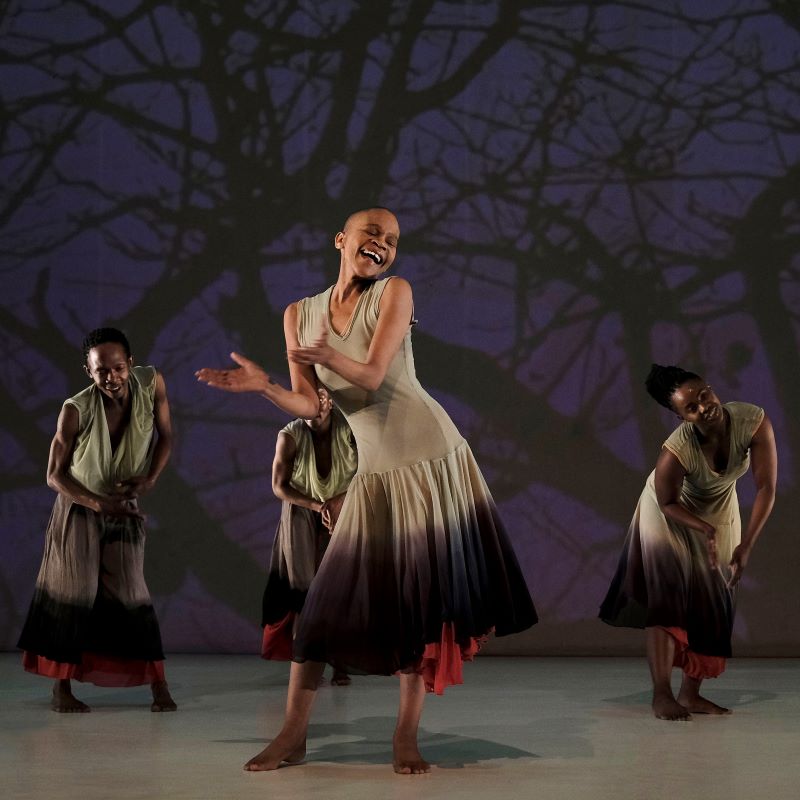by Spring Wise.
Arresting from the very start, when an intimidating open stage welcomes a semi-naked dancer in powerful movement, this is the most exciting dance performance I’ve seen in many years. I came in knowing only that this work was inspired by Pina Bausch’s Rite of Spring and Tswana dance and ritual, native to Botswana, performed by a South African dance company.
Dada Masilo, the choreographer, is also the principal dancer, bringing an incredible physicality and emotional range to the role, though this is an intimate ensemble piece. A very small orchestra of multi instrumental musicians are on stage throughout, and the interplay between the sound and movement of the whole company feels organic and spontaneous and symbiotic from the very first bar. At times it feels like it’s swelling from the very centre of the earth.
When Stravinsky wrote his original score for this story in 1913 he controversially broke about every rule of music at the time (as well as of course telling the pagan story of a sacrifice to appease the gods of springtime, which scandalised the audience) and the score for this entirely new production was absolutely born from the same intention to express gut emotion in the most unadulterated form, however discordant or unexpected. At one point, a washing machine pipe becomes an instrument as it’s swung through the air!
Dancers collaborate by bringing percussive sounds from their footfalls and bodies, with frequent call and response interplay with the musicians, and the most breathtaking control in poignant, lingering moments of silence. The motion cycles and spikes between angularity and liquidity, with glorious contrast between weightlessness and explosive power. I found myself holding my breath many times.
The treatment of costume and nudity, right from that very first scene, communicated that this was to be a story about a pure and integral human experience. Here is a human body, nothing more. The sacrifice is specifically a maiden (during a Q&A session after the performance, Masilo explained that in Botswana, an “untouched” virgin does not cover her breasts because they are not considered to be sexual) but the fluidity of costuming and gesture as the piece unfolds blurs the line between this chosen young woman and her community. By the final scene, gender definition no longer existed, all dancers wore identical white garments with bare chests, entirely of one identity.
There were periods of the show which felt less like watching a performance than witnessing the heartfelt rituals of a community, and even being invited into them. A comical interplay between the musicians and dancers brought a casual and unselfconscious feeling to the audience, which was soon replaced by an almost voyeuristic discomfort at witnessing what felt like deeply personal emotional struggle and private spiritual practise, and ultimately grief.
I was caught entirely off-guard by opera singer Ann Masina’s desperate lament as the maiden’s sacrifice is completed. We’ve already witnessed agonising, devastating death throws in the arms of her community, which defied the laws of gravity so ethereally that the boundaries between one body and another blurred like ink in water, but our hearts are finally broken by Masina’s incredible voice and stage presence.
This is a show deserving of a far bigger audience. If you possibly, possibly can, you must see it. You don’t even have to be into dance, I promise.
- Tickets for Dada Masilo’s The Sacrifice (7 – 8 March) start at £14.50 and are on sale at mayflower.org.uk or 02380 711811.
Want another opinion? Read what our second reviewer has to say:
by Alex Thurley-Ratcliff.
Mesmerising, enigmatic, moving, musically innovative – this dance piece by South African choreographer, Dada Masilo, was a delight to see in Southampton.
The piece started with a slow rhythmical movement, almost mystical, with a fusion of African instruments and rhythms, washing machine tube, bird whistles, violin and voice, as an introduction to Dada Masilo and company, the presentation of character, of theme and emotion.
The first half moves through playful, intense and reflective moods – all based on the theme of ritual. It includes spoken word from the dancers, interaction with the musicians, hand claps, breathy sighs and amazing vocals. When you cannot understand the language, it forces you to examine every nuance and position of the dancers, as individuals and as a company.
The second half reflects on sacrifice – a more sombre, emotional and at times violent and grief-stricken movement, but with such richness in the music and voice, the singer interacting with Dada dancing as sacrifice, that you are swept up in the whole – a truly uplifting experience.
It’s a challenging piece if you aren’t used to contemporary dance, and in an unknown language, but it’s also a privilege to see a world-class choreographer and company perform. Dance of this quality inevitably makes me think and feel within the context of the physical theatre and the specific piece – we see movement, great craft and creativity, bodily power, excellent performance, and the connection of body, movement, soundscape and emotion, of community and relationship. I felt that, while humans cannot fly, we can dance and sing – and this is enough.
Organised by the Dance Consortium around 14 venues, I was honestly surprised to see this in Southampton – so I hope more of the same can be staged here. If you can, go and see this tonight (Match 8) before the tour heads north.
- In Common is not for profit. We rely on donations from readers to keep the site running. Could you help to support us for as little as 25p a week? Please help us to carry on offering independent grass roots media. Visit: https://www.patreon.com/incommonsoton

